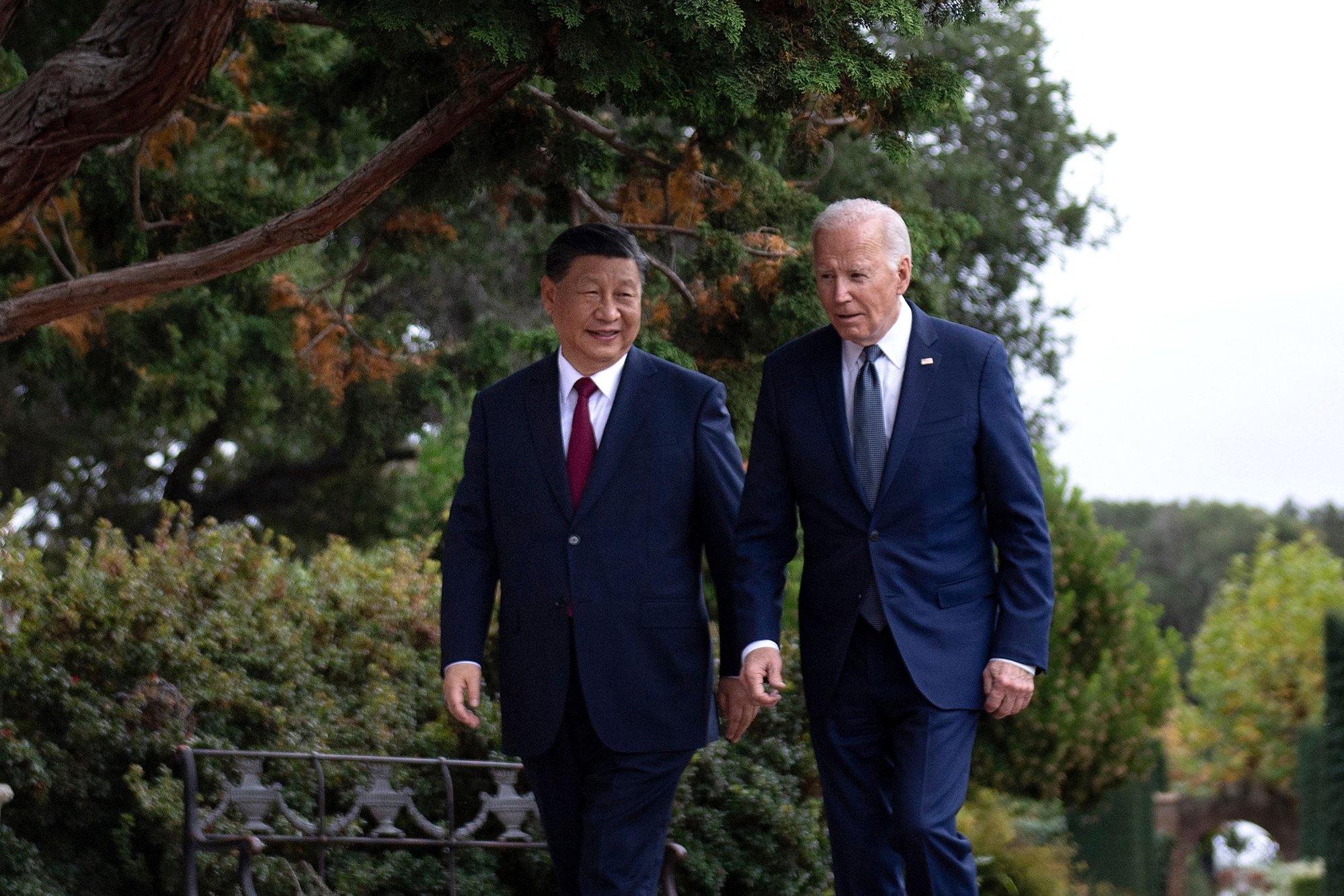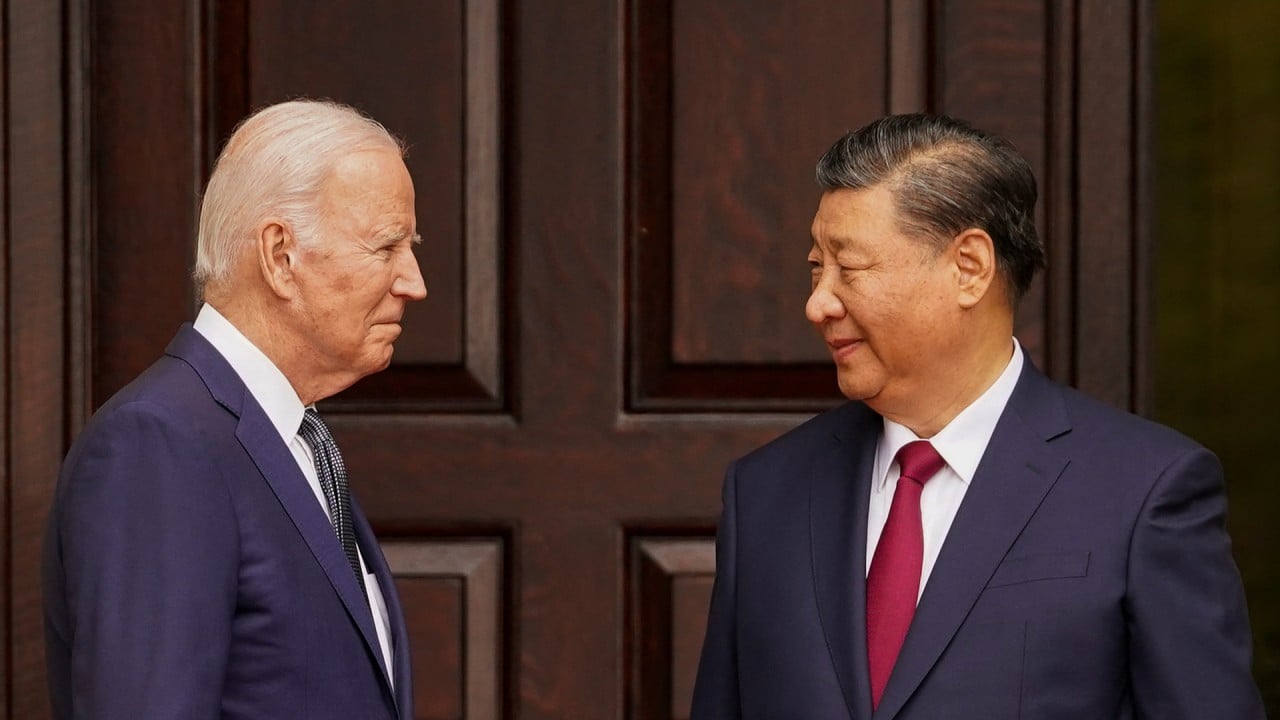
Are US-China relations destined to end up as a ‘new cold war’?
- Antony Blinken is the latest senior US official to visit China, but some analysts believe Washington needs to set out a clear vision for future relations
- Although both sides may wish to avoid outright conflict, there are profound differences and a lack of trust that will be very difficult to overcome
With some describing the situation as a “new cold war”, there are growing calls within Washington for the US to formulate a clearer policy on how it wishes to engage with China.
Zhiqun Zhu, a professor of international relations at Bucknell University in the US, said both sides viewed stability as a priority as shown by recent high-level exchanges, including last month’s phone call between Presidents Xi Jinping and Joe Biden, as well as recent visits by US Treasury Secretary Janet Yellen and Secretary of State Antony Blinken.
He said that with Biden trying to win November’s election and dealing with crises in Ukraine and the Middle East, “the last thing he wants now is a conflict with another great power”.
Likewise with Xi, a “smooth working relationship with the US is imperative” as he grapples with economic challenges at home and rising tensions in the South China Sea and Taiwan Strait.
“In this context, it is not hard to understand why both leaders want to maintain stability and keep communication channels open in the relationship,” Zhu said.
“Managing this complex relationship is never going to be easy, but it seems that both sides are cautious and are trying to avoid conflict. This is a better approach than a confrontational one.”
Recent talks also spoke to both sides’ anxiety that relations could continue to spiral downwards, said Dylan Loh, assistant professor of foreign policy at Nanyang Technological University in Singapore.
Biden and US trade office target China’s steel, maritime and logistics sectors
He said Xi and Biden had agreed to “put guardrails in place” when they met in November and increased communication was a “key manifestation” of that.
During his visit last week, Blinken met various senior officials, including Xi, as both sides pledged to continue high-level engagement, but little progress appeared to have been made on the most challenging issues.
“No one is seriously expecting any serious breakthroughs in their relationship but at least they are communicating regularly and at the highest levels,” Loh said.
There are already some signs of improvement. Zha Daojiong, a professor at Peking University’s School of International Studies, said the exchanges have resulted in the establishment of new working groups on economic and financial policy and the resumption of other groups covering areas ranging from climate change, drugs and military affairs.
Zha said things had gone “back to normal” in the fight against illicit drugs and the trafficking of chemicals used to make fentanyl, adding that the increase in direct flights between the two countries was another “step in the right direction”.
But while things might be on a more stable footing, Dominic Chiu, a senior analyst at the Eurasia Group, argued: “Relations are still on a long trajectory of decline”.
He said continued engagements would not solve the fundamental issues plaguing relations, such as Taiwan and the deepening competition over technology.
Chiu said such issues are “structural because they hit at the heart of US-China rivalry and red lines in such a way that neither side is willing to make satisfactory concessions to come to a long-term resolution”.
He added: “There is no avenue for resolving those issues now, other than continued dialogue.”
Both issues were raised by Xi during his call with Biden, during which he stressed that Taiwan was “the first red line that must not be crossed”.
Beijing regards Taiwan as part of China that must eventually be reunited with the mainland – by force if necessary. Meanwhile the US, in common with most countries, does not recognise Taiwan as independent but is opposed to a forcible change in the status quo and is legally bound to arm the island to help it defend itself.
The Chinese leader also accused the US of trying to “suppress” China’s technological development, warning that Beijing would not “sit back and watch” if Washington was bent on containing its growth.
Chiu said Xi’s message to Biden was that Beijing’s patience was “essentially running thin”, especially regarding the tech issue, and said that actions such as export curbs made the situation “unsustainable”.
But there appears to be a bipartisan consensus in Washington which means that the current tech curbs are likely to continue regardless of who is in power.
Zhu from Bucknell University, pointed to another structural issue, arguing that the US, as the current leading global power, would not allow a peer competitor to unseat it, especially one that did not share its values.
US Senate passes bill to force ByteDance to sell TikTok or face ban of the app
Meanwhile China is becoming increasingly frustrated with perceived American interference in areas such as Taiwan and the South China Sea.
“The rise of China itself will make the US uncomfortable regardless of China’s intentions,” he said.
Zhu also warned that neither side trusts the others and this problem will be “hard to resolve unless and until the two powers sit down and earnestly agree that they plan to co-exist peacefully without harming each other’s core interests”.
Loh from Nanyang Technological University, had a similar assessment, saying: “There are plenty of things they disagree on and until strategic trust is increased, or put another way, they distrust each other less, it is very difficult to see solid, substantive improvement.”

Robert Daly, director of the Kissinger Institute on China and the United States, agreed that the two countries are engaged in a “new kind of cold war” that will have to be “carefully managed”.
He suggested that Washington was following a cold war approach of trying to avoid conflict as it competes with China.
“There is no sign that the Biden administration is playing down the rivalry or that it has changed its assessment of threats posed by China’s Communist Party,” he said.
Fei-Ling Wang, international affairs professor at the Georgia Institute of Technology, also saw signs of a new type of cold war – punctuated by “zigzags and ups and downs” – but he said engagement was still useful in managing the relationship between the two countries.
Even though there was little expectation that current rounds of high-level talks will lead to a breakthrough, “it is always better to talk ”.
But he said the profound differences between the two could only be addressed by a “great transformation in Chinese politics and worldview” or “American capitulation to Chinese power and demands” – both of which will be difficult to bring about.
Biden accuses China of ‘cheating’ amid call for added steel, aluminium tariffs
The Biden administration’s approach towards China has, however, faced criticism in some quarters in Washington.
Recently two prominent Republican policymakers – Donald Trump’s former Asia adviser Matthew Pottinger and Wisconsin congressman Mike Gallagher – argued in a Foreign Affairs essay that managing competition with China was “not a goal but a ‘counterproductive’ method.”
They called for a tougher approach and accused Biden’s administration of prioritising a “short-term thaw with China’s leaders at the expense of a long-term victory over their malevolent strategy”
Many analysts agree that Washington needs to set out a clear end goal.
Chiu, from the Eurasia Group, said the Biden administration’s ultimate goals are not “clearly defined” and that managing competition was “at best an intermediate goal to achieve a higher goal”.
According to Chiu, American lawmakers have a wide range of preferred outcomes that range from regime change to “coming to a grand bargain” with China.
“The lack of a unified US goal on China reflects the lack of a unified political leadership that would have the authority to define what the goal is and implement it without suffering backlash or obstruction from the other side,” he said. “Lawmakers need to be clearer on end goals in order to formulate good policy.”
Zhu added that American policymakers appeared to agree that Washington should be tough on Beijing – but that alone would not solve the problem.
“Hawks in the US government should understand that the unipolar world dominated by the US is coming to an end, and that the US needs to co-exist with China and work with China constructively to address existential threats to the world such as climate change and the two ongoing wars [in Gaza and Ukraine],” he said.


